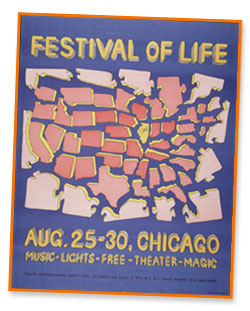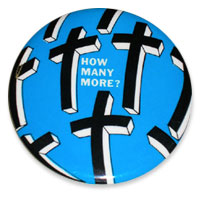Peace
High School: Grades 9–12
Background Information
Chicago in 1968
Despite being the nation's second-largest city and enjoying a strong economy, Chicago suffered a difficult year in 1968. In April, riots broke out on the West Side after Martin Luther King, Jr., was assassinated. The Chicago police tactic of using minimal force drew criticism from Mayor Richard J. Daley, who advocated a more extreme response.
National organizations made plans to protest in Chicago during the National Democratic Convention that August. City authorities, drawing on experience from the previous riots, wanted to avoid all disorder and planned a massive show of force. Protesters and police clashed in televised confrontations. Although polls showed that a majority of Americans approved of police actions and Mayor Daley's law-and-order stand, by the end of 1968 Chicago had become a symbol of the nation's problems relating to the Vietnam War.
Source: The Electronic Encyclopedia of Chicago
1968 Democratic National Convention
Mayor Richard J. Daley persuaded the Democratic Party to hold its 1968 presidential convention in Chicago. The convention took place during the unpopular Vietnam War, and activists made plans to come to Chicago to protest. Yippies (the Youth International Party) organized a "Festival of Life" and thousands joined them.
When the Democratic Party endorsed a pro-war platform, violence broke out between demonstrators and the Chicago police. The worst occurred on August 28 after police stopped protesters from marching from a Grant Park rally to the Amphitheater, where the convention was gathered. A crowd converged on Michigan Avenue in front of the Hilton Hotel, and, as television crews filmed, the clash turned violent. Millions of television viewers tuned in for the convention coverage and saw riots instead, a contributing factor in Democrat Hubert Humphrey's eventual loss to Republican Richard M. Nixon in the presidential election.
Source: The Electronic Encyclopedia of Chicago
Downloads (pdf)


